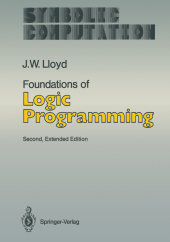 Neuerscheinungen 2011Stand: 2020-01-07 |
Schnellsuche
ISBN/Stichwort/Autor
|
Herderstraße 10
10625 Berlin
Tel.: 030 315 714 16
Fax 030 315 714 14
info@buchspektrum.de |

John W. Lloyd
Foundations of Logic Programming
2. Aufl. 2011. xii, 212 S. XII, 212 p. 244 mm
Verlag/Jahr: SPRINGER, BERLIN 2011
ISBN: 3-642-83191-5 (3642831915)
Neue ISBN: 978-3-642-83191-1 (9783642831911)
Preis und Lieferzeit: Bitte klicken
In the two and a half years since the frrst edition of this book was published, the field of logic programming has grown rapidly. Consequently, it seemed advisable to try to expand the subject matter covered in the first edition. The new material in the second edition has a strong database flavour, which reflects my own research interests over the last three years. However, despite the fact that the second edition has about 70% more material than the first edition, many worthwhile topic!! are still missing. I can only plead that the field is now too big to expect one author to cover everything. In the second edition, I discuss a larger class of programs than that discussed in the first edition. Related to this, I have also taken the opportunity to try to improve some of the earlier terminology. Firstly, I introduce "program statements", which are formulas of the form A+-W, where the head A is an atom and the body W is an arbitrary formula. A "program" is a finite set of program statements. There are various restrictions of this class. "Normal" programs are ones where the body of each program statement is a conjunction of literals. (The terminology "general", used in the first edition, is obviously now inappropriate).
1. Preliminaries.-
1. Introduction.-
2. First Order Theories.-
3. Interpretations and Models.-
4. Unification.-
5. Fixpoints.- Problems for Chapter 1.- 2. Definite Programs.-
6. Declarative Semantics.-
7. Soundness of SLD-Resolution.-
8. Completeness of SLD-Resolution.-
9. Independence of the Computation Rule.-
10. SLD-Refutation Procedures.-
11. Cuts.- Problems for Chapter 2.- 3. Normal Programs.-
12. Negative Information.-
13. Finite Failure.-
14. Programming with the Completion.-
15. Soundness of SLDNF-Resolution.-
16. Completeness of SLDNF-Resolution.- Problems for Chapter 3.- 4. Programs.-
17. Introduction to Programs.-
18. SLDNF-Resolution for Programs.-
19. Declarative Error Diagnosis.-
20. Soundness and Completeness of the Diagnoser.- Problems for Chapter 4.- 5. Deductive Databases.-
21. Introduction to Deductive Databases.-
22. Soundness of Query Evaluation.-
23. Completeness of Query Evaluation.-
24. Integrity Constraints.- Problems for Chapter 5.- 6. Perpetual Processes.-
25. Complete Herbrand Interpretations.-
26. Properties of T´p.-
27. Semantics of Perpetual Processes.- Problems for Chapter 6.- References.- Notation.


